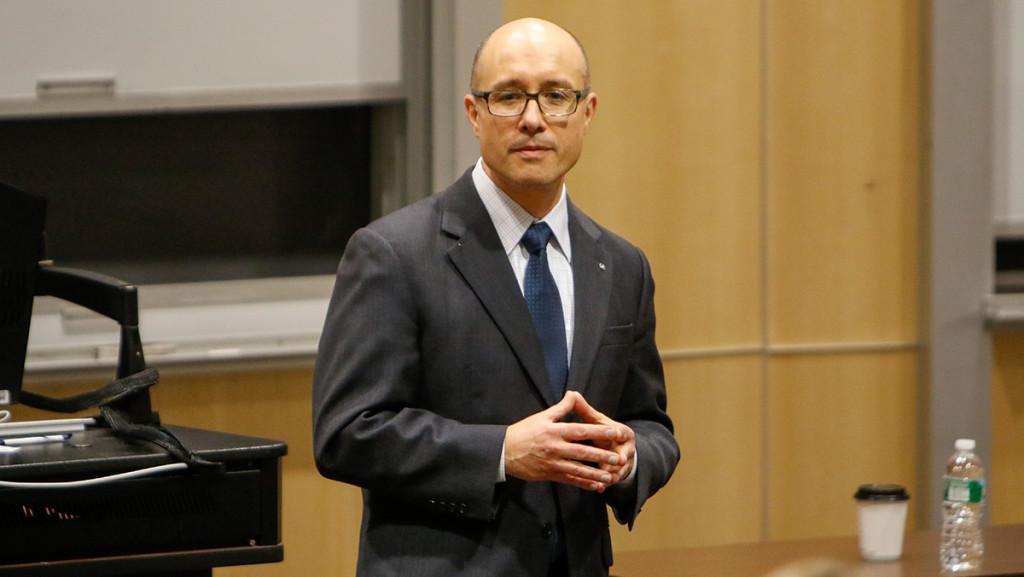The first of four finalists for the permanent position of dean of the School of Humanities and Sciences came to Ithaca College on Dec. 1 to engage in interviews and meet with staff.
Antonio Cepeda-Benito, psychology professor and former dean of the College of Arts and Sciences at the University of Vermont, interviewed to replace Leslie Lewis, who left the college in July. Lewis is now provost and vice president of academic affairs at Goucher College in Baltimore.
The campus community was invited to an open presentation and discussion with Cepeda-Benito in Textor 102 from 12:05–1 p.m. during his campus visit. Approximately 60 faculty members and students attended the event, including senior Alexa Cepeda, Cepeda-Benito’s daughter.
After beginning the presentation by discussing his background, he described what he viewed to be his greatest accomplishments as dean at the University of Vermont: correcting the budget, increasing retention rates and improving student satisfaction. He then said he was drawn to Ithaca College because of its members’ belief in continual improvement and openness to change.
During the 35-minute Q&A session, Cepeda-Benito emphasized the need to increase resources and his experience in the area of tackling deficit.
He also expressed his support for interdisciplinary work, a the need for accountable leadership in diversity issues, having a transparent budget, the need to build trust with faculty and a cooperative rather than advocative approach to the humanities. He talked about his personal connection to the liberal arts.
“I am not who I am without the liberal arts education,” Cepeda-Benito said. “The best courses that I took were in liberal arts. I could learn things about myself by taking a dance class.”
Jamie Ellis, assistant professor in the Department of Chemistry, attended an early faculty session and said she appreciated Cepeda-Benito’s goal to “mold himself” to the college and liked his statements about the role of liberal arts.
Cepeda-Benito has seen controversy at the University of Vermont.
At the University of Vermont, when he was up for his third review as dean, Cepeda-Benito sent out a 16-page letter to arts and sciences faculty promoting what he thought he accomplished during his role, according to an article in the Vermont Cynic, UVM’s student newspaper. This upset some faculty members, who felt he was trying to “sell himself” to influence the review.
Denise Youngblood, a professor of history and former president of UVM’s faculty union, said Cepeda-Benito did not make an effort to learn anything about the culture of University of Vermont, his bureaucratic system of leadership did not work well and if the college were to hire him, it would be “a huge mistake”.
“He is not willing to listen to diverse points of view,” Youngblood said. “He never changed his mind about anything. He is not the least bit interested in cultural diversity issues even though he talks the talk.”
Youngblood cited several instances of questionable leadership, including cutting the Portuguese program and “his cavalier and disrespectful mistreatment of women on campus.” She said the faculty women’s caucus, of which she is a member, wrote a letter to the president of UVM protesting this behavior.
Cepeda-Benito said he was never informed of such a letter and cited diversity awards he received at Texas A&M, where he worked for 18 years, and advancing the development of women faculty in STEM fields.
“To say I do not walk the talk is simply untrue,” he said.
Since his third-year review, Cepeda-Benito has stepped down from his position as dean. He remains a psychology professor but is currently on sabbatical.
Cepeda-Benito said he chose to leave his position as dean because he was feeling opposition to his leadership style, as he had to make difficult choices in the wake of budget difficulties, renegotiation of bargaining agreements with faculty and a transitioning administration.
Joel Goldberg, associate dean of the College of Arts and Sciences at UVM, said he does not know why Cepeda-Benito chose to leave the position.
“I’m not sure that I would think of his departure as controversial,” Goldberg said. “It was a decision that he made. I understand that there are challenges in pleasing all of the different factions of students and faculty and administrators, [but] he is very bright, very hardworking and cares very deeply about the students and faculty. He has a wealth of interesting ideas.”
Ellis said she was surprised that he didn’t address negative articles she had read about him.
“I feel like in an interview with those types of articles present online about you, you might want to address them. And he didn’t,” Ellis said. “I would want to talk about those issues directly.”
The open presentations for the other candidates will be 12:05–1 p.m. Dec. 3, 8 and 10, all located in Textor 102. Dr. Teresa Longo, associate professor of Hispanic Studies and former Dean for Curriculum Review at the College of William and Mary, will be presenting Dec. 3.
Diane Gayeski, dean of the Roy H. Park School of Communications and chair of the H&S dean search committee, said there is a link to a feedback form online. The committee is hoping to choose a dean by the end of next week.
Correction: A previous version of this article referenced an investigation at Texas A&M, which has since been closed. Additional comments by Cepeda-Benito were also added.








